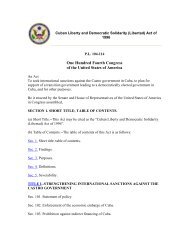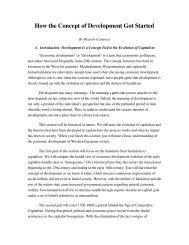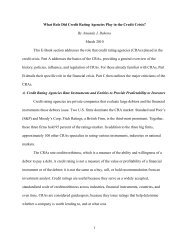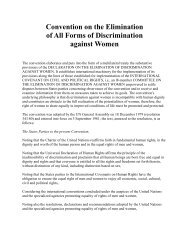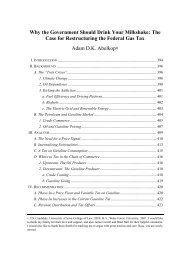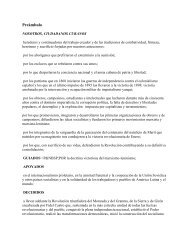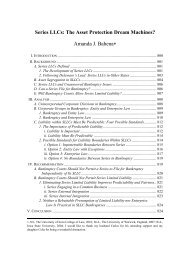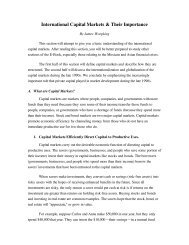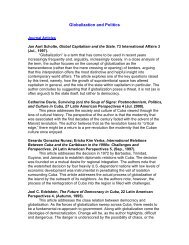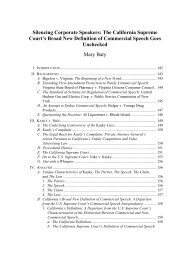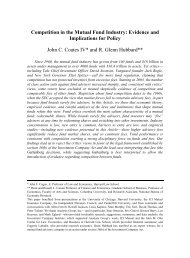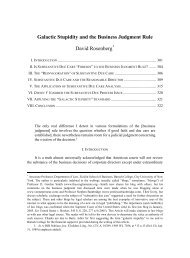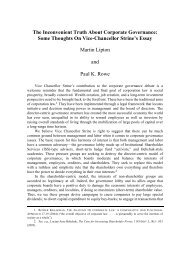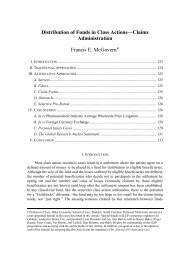Regulation of Foreign Direct Investment After the Dubai Ports ...
Regulation of Foreign Direct Investment After the Dubai Ports ...
Regulation of Foreign Direct Investment After the Dubai Ports ...
You also want an ePaper? Increase the reach of your titles
YUMPU automatically turns print PDFs into web optimized ePapers that Google loves.
296 The Journal <strong>of</strong> Corporation Law [34:1<br />
by restricting foreign investment flow across U.S. borders. 7 This tightening <strong>of</strong> FDI has<br />
led to a balancing act between regulating potential foreign threats and not alienating <strong>the</strong><br />
foreign investors who legitimately improve <strong>the</strong> U.S. economy. 8<br />
A. The Turbulent History <strong>of</strong> <strong>the</strong> Legislature Choosing Sides Between FDI and National<br />
Security<br />
The U.S. government regulates foreign investment under <strong>the</strong> authority granted to it<br />
by <strong>the</strong> Commerce Clause <strong>of</strong> <strong>the</strong> U.S. Constitution. 9 The Commerce Clause gives<br />
Congress <strong>the</strong> power to ―regulate commerce with foreign nations, and among <strong>the</strong> several<br />
states.‖ 10 The current attempt to regulate FDI started in <strong>the</strong> 1970s when Congress began<br />
investigating <strong>the</strong> large inflow <strong>of</strong> FDI. 11 In response, Congress passed <strong>the</strong> <strong>Foreign</strong><br />
<strong>Investment</strong> Study Act <strong>of</strong> 1974 and <strong>the</strong> International <strong>Investment</strong> Survey Act <strong>of</strong> 1976. 12<br />
These Acts allowed <strong>the</strong> President to collect information on international investment and<br />
provide information to Congress. 13<br />
1. Committee on <strong>Foreign</strong> <strong>Investment</strong> in <strong>the</strong> United States<br />
Governmental investigation under <strong>the</strong> <strong>Foreign</strong> <strong>Investment</strong> Study Act <strong>of</strong> 1974 led<br />
Congress to conclude that ―<strong>the</strong> United States lacked a coherent mechanism to monitor<br />
foreign investment.‖ 14 In response to <strong>the</strong> investigation, President Ford created <strong>the</strong> CFIUS<br />
through an executive order in 1975. 15 He gave <strong>the</strong> committee <strong>the</strong> task <strong>of</strong> ―continuing<br />
responsibility within <strong>the</strong> Executive Branch for monitoring <strong>the</strong> impact <strong>of</strong> foreign<br />
investment in <strong>the</strong> United States . . . and for coordinating <strong>the</strong> implementation <strong>of</strong> <strong>the</strong> United<br />
States policy on such investment.‖ 16<br />
2. The Exon-Florio Amendment<br />
The next major historical change in FDI regulation occurred in 1988 when Congress<br />
enacted <strong>the</strong> Exon-Florio Amendment to section 721 <strong>of</strong> <strong>the</strong> Defense Production Act <strong>of</strong><br />
7. See Deborah M. Mostaghel, <strong>Dubai</strong> <strong>Ports</strong> World Under Exon-Florio: A Threat to National Security or<br />
a Tempest in a Seaport?, 70 ALB. L. REV. 583, 598–610 (2007) (providing instances <strong>of</strong> Congress reacting to a<br />
national security threat by creating more restrictive measures for FDI).<br />
8. See Chamber Applauds, supra note 2 (stating that ―[t]his bill strikes an appropriate balance between<br />
keeping Americans safe and keeping our economy open to <strong>the</strong> world‖).<br />
9. RAYMOND J. WALDMANN, DIRECT INVESTMENT AND DEVELOPMENT IN THE U.S. 24 (1979).<br />
10. U.S. CONST. art I, § 8, cl. 3; see also WALDMANN, supra note 9, at 24 (explaining that congressional<br />
power to regulate commerce with foreign nations comes from <strong>the</strong> Commerce Clause).<br />
11. See SARA L. GORDON & FRANCIS A. LEES, FOREIGN MULTINATIONAL INVESTMENT IN THE UNITED<br />
STATES 230–31 (1986) (describing how an investigation <strong>of</strong> a large increase in FDI led Congress to pass <strong>the</strong><br />
<strong>Foreign</strong> <strong>Investment</strong> Survey Act and <strong>the</strong> International <strong>Investment</strong> Survey Act, authorizing <strong>the</strong> President to<br />
collect information on FDI inflow).<br />
12. Id. at 231.<br />
13. Id. Congress, under <strong>the</strong> Defense Production Act <strong>of</strong> 1950, originally granted <strong>the</strong> power to <strong>the</strong> President<br />
to investigate and monitor industries that could fill a role in <strong>the</strong> national defense <strong>of</strong> <strong>the</strong> United States. Defense<br />
Production Act, 50 U.S.C. app. §§ 2161–70 (1950).<br />
14. Mostaghel, supra note 7, at 589.<br />
15. Exec. Order No. 11,858, 3 C.F.R. 990 (1971–1975).<br />
16. Id.



